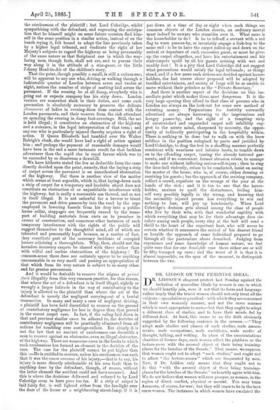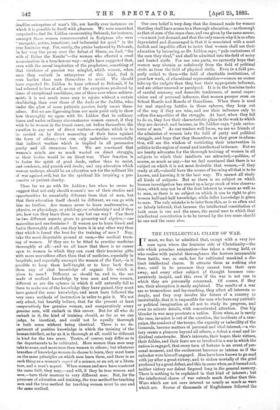DR. LIDDON ON THE FEMININE IDEAL.
DR. LIDDON'S• eloquent protest last Sunday against the imitation of masculine ideals by women is one in which we should heartily join, were it not that its form and language rather imply that the truest women should not only treat all the subjects—speculative or practical—with which they are concerned in their own womanly manner, and not the same manner which is most appropriate to men,—but that they ought to adopt a different class of studies, and to have their minds fed by different food. At least, this seems to us the drift obviously suggested by the following sentence in the sermon :—" They adopt male studies and phases of such studies, male amusements, male occupations, male ambitions, male modes of thought, talking, and writing. In place of the unostentatious charities of former days, such women affect the platform or the lecture-room with the avowed object of their being training. places for the benches of the Senate." That means, we suppose, that women ought not to adopt "such studies," and ought not to affect "the lecture-rooms" which are frequented by men. Now, if Dr. Liddon only means that they ought not to do this "with the avowed object of their being training. places for the benches of the Senate," we heartily agree with him. We do not believe that women will ever prosper, as women, in the region of direct conflict, physical or mental. You may train Amazons, of course, for war; but they will cease to be in the best sense women. The instances in which women have emulated the
deadlier enterprises of man's life, are hardly ever instances on which it is possible to dwell with pleasure. We were somewhat surprised to find Dr. Liddon enumerating Deborah, for instance, amongst those women commemorated in Scripture who were "energetic, active, beneficent, and influential for good" in the true feminine way. For, surely, the praise bestowed by Deborah, in her very fine pwan over the defeat of Siam, on Jael, "the wife of Heber the Kenite"—the woman who effected a cruel assassination in a treacherous way—might have suggested that, even with the moral inspiration of the prophetess, something of that virulence of passion was mingled, which women, when once they embark in enterprises of this kind, find it even harder than men themselves to avoid. We should have expected Dr. Liddon to have referred to Deborah, if he had referred to her at all, as one of the exceptions produced by times of exceptional conditions, one of those over whose achievements it is not much more easy to rejoice without a certain shuddering, than over those of the Jaels or the Judiths, who, under the glow of some patriotic passion, fairly unsex themselves. But we are digressing from our main point only to show how thoroughly we agree with Dr. Liddon that in ordinary times and under ordinary circumstances women cannot, if they wish to be women in the truest sense, set before themselves the vocation to any sort of direct warfare,—warfare which is to be carried on by direct measuring of their force against the force of others,—but can only undertake successfully that indirect warfare which is implied in all persuasive purity and all strenuous love. We are convinced that women's minds are as much wasted on direct struggle, as their bodies would be on direct war. Their function is to foster the spirit of good deeds, rather than to resist, and condemn, and punish evil deeds ; and any education which women undergo, should be an education not for the militant life of war against evil, but for the spiritual life inspiring a persuasive or patient charity.
Thus far we go with Dr. Liddon ; but when he seems to suggest that not only should women's use of their studies and opportunities be essentially different from that of men, but that their education itself should be different, we can go with him no further. Are women never to learn mathematics, or physics, or physiology, or philology, or scholarship ? and if they are, how can they learn them in any but one way ? Can there be two different aspects given to geometry and algebra,—one masculine and one feminine ? • If women are to learn Greek and Latin thoroughly at all, can they learn it in any other way than that which is found the best for the training of men ? Nay, take the most disputable ground at once,—the medical training of women. If they are to be fitted to practise medicine thoroughly at all,—and we all know that there is no career open to women in which they can exert their feminine gifts with more marvellous effect than that of medicine, especially in hospitals, and especially amongst the women of the East,--is it possible to keep them half-taught, or to keep back from them any of that knowledge of organic life which is given to men P Different as should be, and is, the use made of medical knowledge by true men and true women, different as are the spheres in which it will naturally fall to them to make use of the knowledge they have gained, they must have gained the same knowledge, and must have followed the very same methods of instruction in order to gain it. We not only admit, but heartily belie.ve, that for the present at least comparatively few genuine women, and comparatively many genuine men, will embark in this career. But for all who do embark in it, the kind of training should, so far as we can judge, be identical, and could not be equally thorough in both sexes without being identical. There is no department of positive knowledge in which the training of the human intellect, so far as it is thorough at all, could be different in kind for the two sexes. Tastes, of course, nuCy differ as to the departments to be cultivated. More women than men may take to some, and more men than women to others ; but whatever branches of knowledge women do choose to learn, they must learn on the same principles on which men learn them, and there is no such thing as a woman's aspect of a science, or an art, or a literature, and a man's aspect. When women and men have mastered the same field, they may,—and will, if they be true women and men,—turn their mastery to very different uses. Bat, for the purposes of education and training, the true method for teaching men and the true method for teaching women must be one and the same method. Our own belief is very deep that the demand made for Niemen that they shall have access to a thorough education,—as thorough as that of men of the same class, and one given by the same means, —is a most just demand, and that the only reason why it is so often depreciated and discouraged is that it is associated with a most foolish and impolitic effort to insist that women shall use their education by becoming, as Dr. Liddon says, "pale caricatures of the men they rival," and shall be admitted into the field of noisy and heated strife. For our own parts, we earnestly hope that women may abstain as sedulously from the field of political strife as from the field of physical strife. Even in a field properly suitei to them—the field of charitable institutions, of poor-law work, of educational representation—women no sooner take-up the cudgels than they lose their appropriate influence, and are either unsexed or paralysed. It is in the feminine tasks of careful economy and domestic tenderness, of moral supervision and of personal influence, that women prosper even on School Boards and Boards of Guardians. When there is need for real stand-up battles in these spheres, they keep out of the way if they are wise, and use their influence only to soften the asperities of the struggle. At least, when they fail to do so, they lose their characteristic place in the work to which they are devoted, and become, as Dr. Liddon says, "pale caricatures of men." As our readers well know, we are no friends of the admission of women into the field of party and political struggle, and hope that they themselves, as they grow in education, will see the wisdom of restricting their intervention in politics to the region of moral and intellectual influence. But we are hearty advocates for the thorough training of women in all subjects to which their intellects are attracted,—politics, of course, as much as any,—for we feel convinced that there is no subject on which it is not most desirable that women,—if they study at all,—should have the means of knowing all that is to be known, and knowing it in the best way. We cannot all study all kinds of subjects. But as there is no subject on which human investigation has stored up a large stock of wise observations, which may not be of the first interest to women as well as to men, so there is no subject on which it can be right to give women half-and-half knowledge, while fuller knowledge is given to men. The only mistake is to infer from this, as is so often and so falsely inferred, that because the intellectual constitution of both sexes is one and the same, the moral uses to which that intellectual constitution is to be turned by the two sexes should be one and the same also.



































 Previous page
Previous page